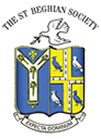|
 |
The Old St Beghian | |
| January 2021 | |||
Neil Dumbleton (FS 60-64) has kindly contributed some:
memories of St Bees.“I have enjoyed the reminiscences of a number of contemporaries at St Bees printed in recent issues of the Old St Beghian. After decades of focusing on other priorities in our lives, it seems natural that our post retirement years should provide a welcome and overdue opportunity to look at where we've come from. I certainly share the generally upbeat sentiment of previous contributions, even if some of those memories (sport, three-quarter days, extra-curricular activities) are considerably warmer than others (CCF, double physics, Foundation House food!). Overall, the pluses certainly outweighed the minuses.
However, there have been comparatively few words written in recent contributions about teaching at the school. There is clearly no means of knowing where St Bees stood in the academic league table of private schools in north-west England in the 1960s. Like most schools, its teaching staff was drawn from a wide range of backgrounds and drew on a wide range of abilities. From a personal perspective I was particularly indebted to two of them. Nigel Gilpin arrived at the school to teach English literature in 1962, the year that I entered the Lower Sixth. He had a remarkable ability to engage and enthuse his classes. It was he above all who taught me to reach my own conclusions about the set texts and then prepare my arguments to justify those conclusions. After years of simply memorising facts and quotations and then regurgitating someone else's opinions, this was a radically new departure. Possibly sub-consciously, I applied that lesson to my main subject, history, in which Ronald Johnson had pumped me with facts through 'O' Level. But I am at least equally indebted to him. After two years of concentrating on the 18th and 19th centuries, it was Ronald Johnson who recognised that repetition and the resulting boredom had sapped my interest in the subject and who decided, some months before my Cambridge Entrance exams, to divert my studies to the 16th and 17th centuries. Assisted by some private tuition, that proved to be a transformational decision, both in reviving my interest in history and then in passing those exams. Regrettably, I left it too late to express my gratitude to Nigel Gilpin. A letter to his widow was an unsatisfactory substitute. But hopefully Ronald Johnson is still receiving the Old St Beghian in Australia. If that is the case, please accept this very belated message of thanks.
Beyond the teaching and other central features of St Bees life reported in earlier contributions, I also have special memories of a number of exceptional events organised by the school. The pioneering climbing visit to the Atlas Mountains in Morocco in March – April 1963 left a lasting impression on me, and my life-long love of the hills also owes much to days walking in the West Cumbrian fells led by Peter Croft and to adventures climbing with Gordon Dyke. Sport formed a large part of everyone's lives at school, but I feel particularly fortunate to have had the opportunity to engage in so many minor sports. I took up badminton, played a great deal of fives, and began a period of some thirty years chasing the squash ball. Away from St Bees, the school ran theatre trips to neighbouring towns. Top of my memories was my introduction to the work of Dylan Thomas at a performance of Under Milk Wood in Barrow. Finally, my last term at St Bees coincided with the General Election of October 1964. A small group of sixth formers was taken to the final eve-of-election rallies of the two main parties in Whitehaven. The Labour event was a mass gathering of the faithful in a seat that they could not possibly lose. How times have changed!
My academic life at St Bees turned out to be a solid stepping stepping-stone paving the way to my future university and professional career, and I look back on my sporting and extra-curricular activities there as the icing on the cake of my overall school experience. But arguably, even more important to me were the friendships that I made and the social skills that I developed which helped me to build and retain future friendships and professional relationships. Loyalty, teamwork, helping others and learning how to thrive in a competitive environment were not on the school curriculum, but St Bees provided a perfect testing ground on which to develop those skills. Of the friends that I made there, I stayed in touch with Mike Jamison while we were both at Cambridge, and David Griffiths and Anthony Wills both came to my wedding in Belfast. Sixty years after we first met, I am still very close to Richard Langhorne. That alone gives me good reason to look back favourably on over four years at St Bees School.”
Home
The St Beghian Society
St Bees School,
St Bees, Cumbria, CA27 0DS.
Tel: (01946) 828093 Email: osb@stbeesschool.co.uk
Web: www.st-beghian-society.co.uk
![]()